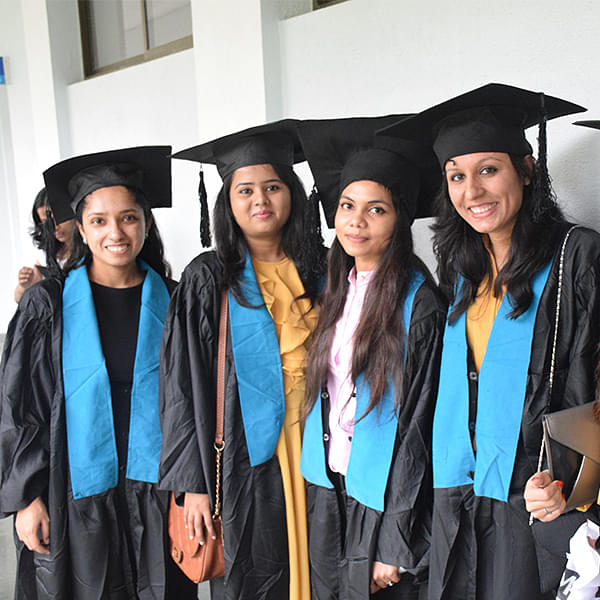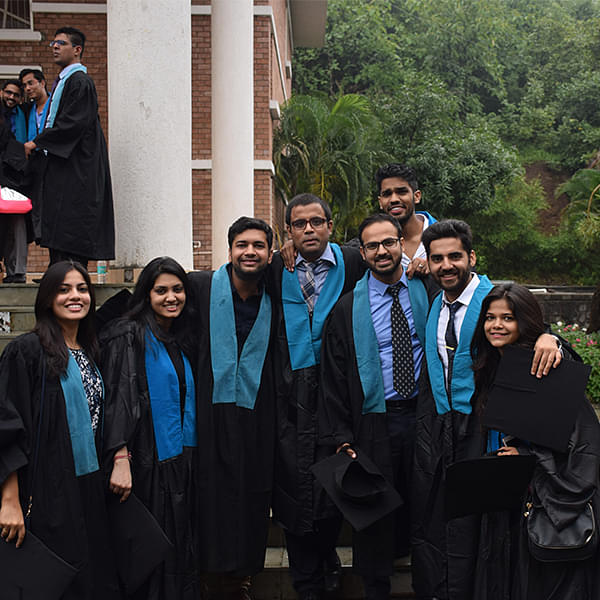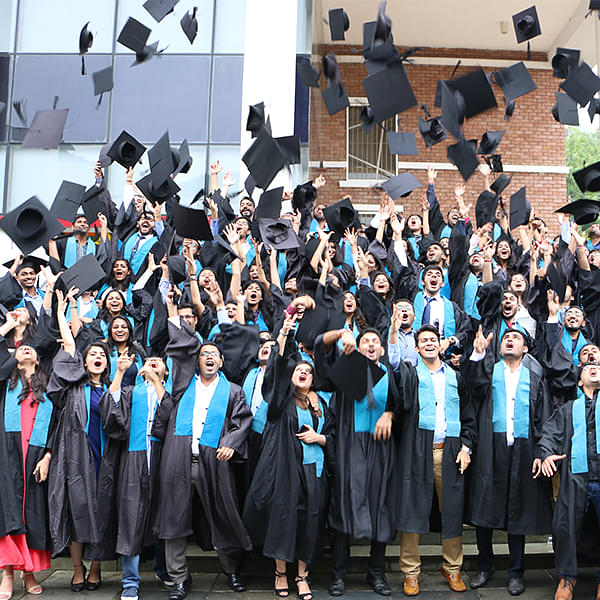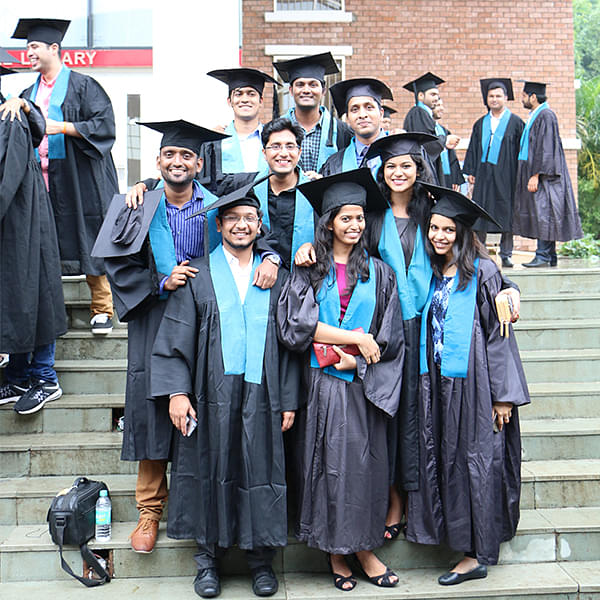
Atul Kumar Sahu is currently enrolled in the MBA-BA course at SCMHRD, Pune. He graduated from SRMIST Chennai with an 8.694 CGPA. Atul cleared the SNAP exam with a 98.83 percentile. He had 2 years of industry experience as a software developer at Infosys Ltd.
Atul Kumar Sahu Profile
- Current institute: SCMHRD, Pune
- Graduation College: SRMIST Chennai
- SNAP score: 98.83 Percentile
- 10th Percentage / GPA: 79.43%
- 12th Percentage / GPA: 83.20%
- Graduation Percentage/GPA: 8.694 GPA
- Work Experience: Infosys Ltd., 2 years 15 days, Software Development
Check SCMHRD, Pune Courses & Fees
Atul Kumar Sahu Admission Experience
Did you avail of the benefit of any reservation?
Atul Kumar Sahu: “General (No reservation)”
Describe the general setting of WAT / GD (if any)?
Atul Kumar Sahu: “The whole process of GEPIWAT was online. WAT and GEPI for the MBA(BA) program at SCMHRD were on different days. A total of 20 minutes were allotted for WAT and we had to write a passage of up to 500 words. There was no separate time allotted to think on the topic for WAT, 20 minutes is what we had in order to think and then form the passage.
Talking about GE, it was actually a GD with 6 candidates and there were two moderators. It wasn't an aggressive GD, the process of the GD was explained to us before giving out the topic. After giving the topic, we were given 2 minutes to think on the topic and then 1 minute each to speak on the topic and make our points. After this, we had to discuss the topic among ourselves and finally, the moderator openly asked for the conclusion of the GD.
What I felt is important for the whole GEPIWAT process is:
- Being present in the moment so as to clearly understand everything that is told or displayed on the screen.
- Learn to control your worries and anxiety about the result of anything which might bother you on D-Day. Your constant worrying will do you no good but can hamper your performance.
- Make sure to conclude or summarize whatever you wrote for WAT or have discussed with others in the GD. For WAT, a conclusion makes your passage look complete, and for GD, concluding with relevant points means that you were present and have understood what has been discussed.”
What was the WAT / GD Topic?
Atul Kumar Sahu: “For WAT, we didn't get a topic. We were given two images and we had to form a connection between the two and then write a story or our opinion or relate it to something in reality. The images given to me consisted of a phrase in one image and the other was a picture of a person dressed up in formal attire, sitting on a chair; there were some mathematical symbols in the image and a hot coffee mug and table lamp. The phrase in the other image said "All that we know is that we know nothing."
The topic for the GD given to my group was ‘Borderless World. Can it be a reality someday?’ "
What were your answer/points put forward for the WAT or GD respectively?
Atul Kumar Sahu: “Talking about the images given to me for WAT, in the second image I saw a person who is into researching and analyzing things(given the mathematical symbols and all). These two images seemed to oppose each other at first and then I thought of scientists observing and trying to understand the universe and then coming out with plausible explanations about so many different things in the universe but, all those information is quite small, almost negligent compared to how much is out there in the universe to know and given the fact the universe is ever-expanding, all we know about the universe is nothing compared to what is out there to know.
My points in GD were as follows:
- Borderless relationships between some countries still exist.
- Borderless World will boost the economies as it will boost tourism due to the end of the hassle to get a visa.
- It will solve unemployment issues in many parts of the world because people will be able to migrate more easily.
- India and Nepal have a borderless relationship and it has worked out fine.
- Foreign policies of nations such as India's Neighbourhood First Policy can lead to a step towards a Borderless World.
It is important to choose a side in WAT and in GD. Do not sway from one side to another. Sticking to a side shows that you know what you are saying and are confident of the information."
Describe the general setting of your personal Interview.
Atul Kumar Sahu: “As mentioned before, the PI was in online mode. For my PI, there were two panelists. Both seemed quite young and perhaps they were in their early 30s. The PI lasted for about 30 minutes or so. I was nervous about the interview but, once it started I felt as if the panelists just wanted to see if I am genuinely interested in the program or have just applied to it without any inclination towards it. They also wanted to see if the information about me in the form is genuine or had I lied in it. Since I had worked, my interview revolved around it and there were only a few questions about analytics as I had no prior experience in that field.
The panelists will frame questions based on what you have told them about yourself in the application form and based on what answers you give during the time of PI. My suggestion would be to not put fake information in the application form so that you don't have to cover it up in the interview because whatever you say, the next question would be based on that, and thus you'll have to cover up your cover-up story and that is a very dangerous trap to fall in in the last round of your journey as an MBA aspirant.”
Check SCMHRD, Pune Admission
Mention at least 5 interview questions that were asked to you and your responses to each of them.
Atul Kumar Sahu: “Q1: Tell me about yourself.
A: Told
Q2: You had a fine job. Why did you leave it? (I left my job in 2020 for preparation)
A: Told them that I didn't get time to prepare since I had to work for really long hours and sometimes even on weekends.
Q3: Did you discuss this with your manager before resigning?
A: I said yes and told them that I had talked to my manager about my aspirations to pursue MBA and mentioned to him how I was not getting enough time to prepare for it. I also told them that my manager had asked me to continue my prep with the job if I couldn't do that even after trying, I can make a decision.
Q4: What would you do if we didn't accept you for our program?
A: I told them about the policy of my last company according to which I can rejoin the company at the same post with the same team within 1 year of my last working day.
Q5: Why would your manager accept you if he already knows your aspiration to pursue MBA?
A: I told them about the quality of my work and the repo I had with my manager, senior manager, and client because of the same and told them that my manager had asked me to contact him in case I needed to rejoin.
Q6: Okay, why do you want to go for an MBA(Business Analytics) and not MBA?
A: I explained to them how MBA(Business Analytics) was an amalgamation of what I had learned to date(I am a Computer Science Engineer) and what I wanted to learn in the future(Business skills, duh!).
Q7: Tell us about two models used in Analytics.
A: Told.
Q8: Give us one example of each.
A: Gave examples.
Q9: Have you won any national/international awards?
A: Told.
Panelists: Thank you, Atul! That's it, you may leave now.”
Mention 3 reasons why you chose this college over other colleges which you converted.
Atul Kumar Sahu: “This was the only offer which I had.”
What was the reason for you not converting other colleges? (if any)
Atul Kumar Sahu: “I applied only for selected colleges and selected programs. I felt that investing 2 years of MBA + 1 year of preparation + a huge sum of money is not worth it if I don't get into one of the top B-Schools of the country. Also, I didn't score enough in other examinations so as to clear the cutoffs of the colleges and programs that I had applied for and I am waitlisted in a few colleges.”
Check SCMHRD, Pune Reviews

![Symbiosis Centre for Management and Human Resource Development - [SCMHRD]](https://images.collegedunia.com//public/college_data/images/appImage/18958_SCMHRD_New.jpg?tr=h-240,w-1000,c-force)
![Symbiosis Centre for Management and Human Resource Development - [SCMHRD]](https://images.collegedunia.com//public/college_data/images/logos/1457587141Screenshot001.jpg?tr=h-71.17,w-71.17,c-force)







![Symbiosis Institute of Business Management - [SIBM]](https://images.collegedunia.com//public/college_data/images/appImage/18961_SIBM_New.jpg?tr=h-111.44,w-263,c-force)

![International School of Management Studies - [ISMS]](https://images.collegedunia.com//public/college_data/images/appImage/1589520718Campus2.jpg?tr=h-111.44,w-263,c-force)









.jpg)







![Indian Institute of Management - [IIMN]](https://images.collegedunia.com//public/college_data/images/logos/1571296491logo22.jpg?tr=h-72,w-72,c-force)
![Indian Institute of Management - [IIM]](https://images.collegedunia.com//public/college_data/images/logos/col30779.png?tr=h-72,w-72,c-force)






![Symbiosis Institute of Business Management - [SIBM]](https://images.collegedunia.com//public/college_data/images/logos/1738824918logo.png?tr=h-72,w-72,c-force)



Comments